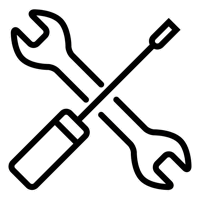Best Value Insulation Resistance Testers
Author: James Osborne Date Posted:3 August 2015
Selecting the Right Insulation Resistance Tester for Your Needs
Insulation resistance testers, or megohmmeters are arguably one of the most used test instruments in the electrical industry. Being able to measure very high levels of resistance is essential to determining the electrical integrity of cabling, motors, and electrical equipment, which makes the insulation resistance tester so widely used.
Most of these megohmmeters can be roughly split into three product groups, based on the test voltage produced. There are those that are capable of producing a test voltage of up to 1000V, those which can output up to 5kV and those that can generate 10kV and even higher than that. The 1000V insulation testers are predominantly hand held, although some of them, such as the AEMC 1060 are housed in a robust field case. These are also the cheapest of the product groups as they tend to be less complex than the higher voltage testers. Nevertheless, some of them like the AEMC 6522 and AEMC 6526 are very capable instruments indeed, with an array of functions and features designed for professional use. Analogue megohmmeters are still very popular but this popularity is gradually waning as the digital units are becoming more and more the standard for most of the electrical industry, doe to their greater accuracy and lack of moving parts.
A wide range of Insulation Resistance Testers up to 15kV
Many of our industrial customers require something with more grunt and thus will be interested in the 5kV and 10kV upwards range. For this, AEMC have an excellent range of meters, such as the AEMC 6505 and AEMC 6550. Granted, you will not get much change out of $5,000 to $10,000 for this calibre of insulation tester, but the differences between these meters and the cheap one flooding online retailers websites are stark to say the least. With the cheaper models, you may have something that is capable of reading up to, perhaps 3GΩ, but with the higher quality AEMC insulation resistance testers, they can read up to 15TΩ before they show an infinite reading. Along with a load of other features such as polarisation index (PI), dielectric absorption ratio (DAR) these meters also usually will have the ability to save and download the readings for reporting purposes.
The 10kV upwards range will cost more but are an essential tool for many of our power engineer customers. Nearly all of these meters, just like the 5kV insulation testers are fully programmable. You can set them to increase the test voltage over time (ramp or step voltage) and you can even select a test voltage from as low as 50V, so these meters are versatile as one insulation resistance tester can be used for a very wide range of insulation testing on various objects. The AEMC 6550 and the AEMC 6555, which is capable of 15kV insulation testing have certainly attracted a following since their release some time ago, Having used them both and also regularly calibrating them in our calibration laboratory, it is difficult to choose between them as both are very capable meters.
In terms of value for money though, we would probably have to give that award to the AEMC 6505 in the 5kV category and the AEMC 6550 in the 10kV+ category as these are excellent instruments, but the AEMC range is very established, and would offer very comparable value for money except for a weaker Australian Dollar. The smaller 1000V hand held units value for money would have to be the Testrite T-1050 or the AEMC 6527. Whichever way you look at it, all insulation resistance testers supplied by us at Testrix Systems are professional quality. We can also calibrate any of these units and service them from our base in Brisbane.




